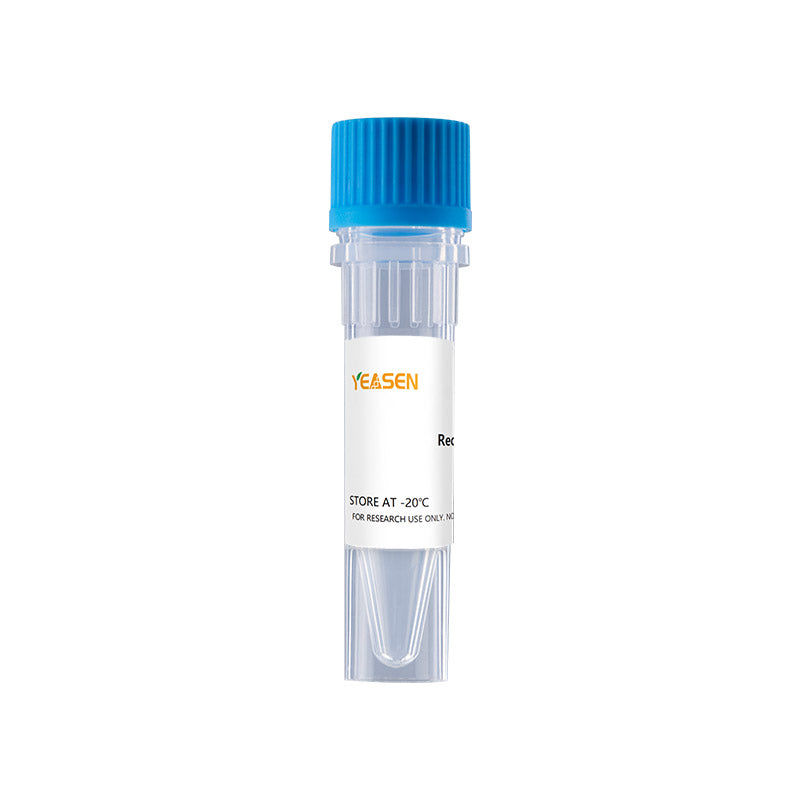Description
CXCL4, also called PF4 (platelet factor 4), is an 8 kDa member of the CXC chemokine family, sharing features with CXCL8/IL-8 and CXCL7/NAP-2. Mature human CXCL4 shares 65-76% amino acid sequence identity with mouse, rat, bovine, ovine and porcine CXCL4. The active protein is a tetramer of CXCL4 subunits that forms a ring of heparin-binding positive charges from sites at the C-terminal region of each monomer. Megakaryocytes synthesize CXCL4 and store it in platelet alpha -granules. Secretion from activated platelets can produce micromolar levels in serum and over 100-fold higher within clots. In contrast to other CXC chemokines, CXCL4 does not contain an ELR motif and lacks binding to nearly all chemokine receptors. A potential high-affinity G-protein-coupled receptor for CXCL4, the CXCR3 isoform CXCR3B, is expressed in human but not mouse. In most cases, it is likely that cell surface binding and signaling properties of CXCL4 are due to binding of glycosaminoglycans chains, particularly chondroitin sulfates. CXCL4 released from activated platelets binds and regulates thrombin/thrombomodulin complexes, regulates and enhances production of activated Protein C (APC), and limits the coagulation cascade. It binds and influences the enzymatic activity of coagulation factor Xa. It binds fibrin and affects clot structure. Therapeutic doses of the anticoagulant heparin neutralize CXCL4 procoagulant effects.
Product Properties
|
Synonyms |
Iroplact, Oncostatin-A |
|
Accession |
P02776 |
|
GeneID |
5196 |
|
Source |
E.coli-derived Human GRO-γ,Glu32-Ser101. |
|
Molecular Weight |
Approximately 7.8 kDa |
|
AA Sequence |
EAEEDGDLQC LCVKTTSQVR PRHITSLEVI KAGPHCPTAQ LIATLKNGRK ICLDLQAPLY KKIIKKLLES |
|
Tag |
None |
|
Physical Appearance |
Sterile Filtered White lyophilized (freeze-dried) powder. |
|
Purity |
> 97% by SDS-PAGE and HPLC analyses. |
|
Biological Activity |
Fully biologically active when compared to standard. The biological activity determined by a chemotaxis bioassay using human fibroblasts is in a concentration of 1.0-10 ng/mL. |
|
Endotoxin |
< 1 EU per 1μg of the protein by the LAL method. |
|
Formulation |
Lyophilized from a 0.2 μm filtered concentrated solution in Acetonitrile and TFA. |
|
Reconstitution |
We recommend that this vial be briefly centrifuged prior to opening to bring the contents to the bottom. Reconstitute in sterile distilled water or aqueous buffer containing 0.1 % BSA to a concentration of 0.1-1.0 mg/mL. Stock solutions should be apportioned into working aliquots and stored at ≤ -20 °C. Further dilutions should be made in appropriate buffered solutions. |
Shipping and Storage
The products are shipped with ice pack and can be stored at -20℃ to -80℃ for 1 year.
Recommend to aliquot the protein into smaller quantities when first used and avoid repeated freeze-thaw cycles.
Cautions
1.Avoid repeated freeze-thaw cycle.
2.For your safety and health, please wear lab coats and disposable gloves for operation.
3.For research use only.
Payment & Security
Your payment information is processed securely. We do not store credit card details nor have access to your credit card information.
Inquiry
You may also like
FAQ
The product is for research purposes only and is not intended for therapeutic or diagnostic use in humans or animals. Products and content are protected by patents, trademarks, and copyrights owned by Yeasen Biotechnology. Trademark symbols indicate the country of origin, not necessarily registration in all regions.
Certain applications may require additional third-party intellectual property rights.
Yeasen is dedicated to ethical science, believing our research should address critical questions while ensuring safety and ethical standards.

